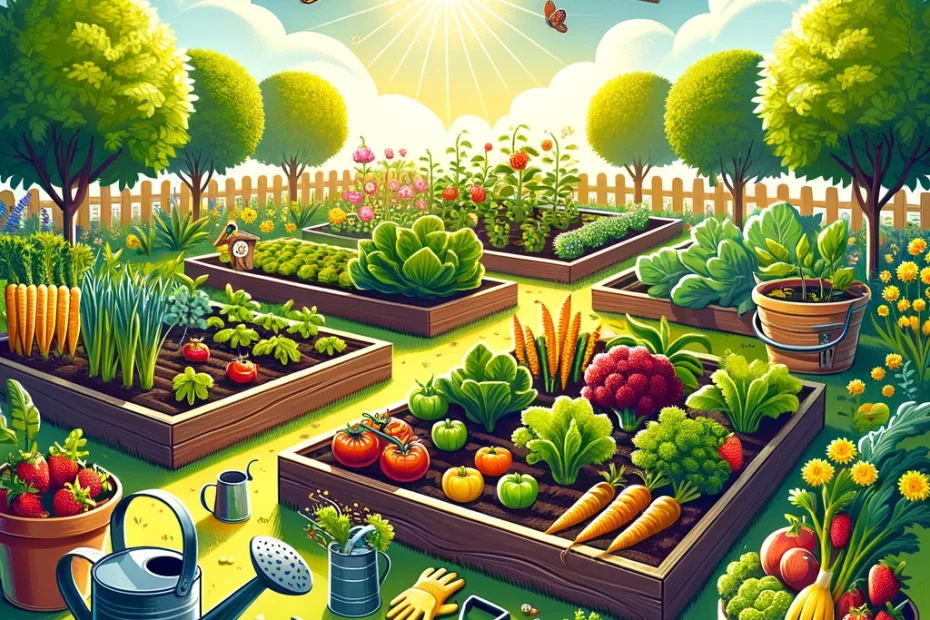Unlock the Secrets to a Thriving Garden and Enjoy the Bounty of Your Own Harvest
Gardening isn’t just a hobby; it’s a journey towards sustainability and self-sufficiency. Growing your own food can be a rewarding experience, offering fresh, organic produce right at your doorstep. This guide is your compass to navigating the world of gardening, ensuring you’re well-equipped to start your own garden, no matter the size of your space or level of your expertise.
Understanding the Basics of Gardening
Before diving into the soil, it’s crucial to understand the foundation of gardening. This section will cover the essential knowledge every aspiring gardener should know, including soil health, plant selection, and the importance of biodiversity.
Soil Health: The Heart of Your Garden
The success of your garden largely depends on the health of your soil. Learn how to prepare and enrich your soil with organic matter, ensuring it has the right balance of nutrients to support your plants.
Choosing the Right Plants
Selecting plants that are suitable for your climate, soil, and sunlight availability is crucial. This section will guide you through choosing plants that will thrive in your garden, from vegetables and fruits to herbs and flowers.
The Role of Biodiversity
Discover the importance of encouraging biodiversity in your garden. By attracting beneficial insects and promoting a variety of plant species, you can create a more resilient and productive garden.
Starting Your Garden
With the basics under your belt, it’s time to start your garden. This section will walk you through the steps of planning, planting, and caring for your garden, ensuring a successful harvest.
Planning Your Garden Space
Learn how to effectively plan your garden space, whether you have a large backyard or a small balcony. This includes understanding the importance of crop rotation and companion planting.
Planting Your Seeds
A step-by-step guide on how to plant your seeds or seedlings, ensuring they have the best start in their growing journey.
Watering, Weeding, and Maintenance
Tips on how to water your plants efficiently, control weeds without chemicals, and maintain your garden through the seasons.
Harvesting and Using Your Produce
The most rewarding part of gardening is enjoying the fruits of your labor. This section will teach you how to harvest your produce at the peak of its freshness and ways to use it in your kitchen.
Harvesting Tips
Learn the signs that your fruits and vegetables are ready to be harvested, ensuring you pick them at their most flavorful.
Preserving Your Harvest
Discover methods for preserving your surplus produce, including canning, freezing, and drying, so you can enjoy your garden’s bounty all year round.
Cooking with Homegrown Produce
Simple and delicious recipes that highlight the taste of fresh, homegrown ingredients, inspiring you to incorporate your garden produce into daily meals.
Overcoming Common Gardening Challenges
Gardening comes with its set of challenges. This section addresses common issues and provides solutions to help keep your garden thriving.
Pest and Disease Management
Natural strategies for managing pests and diseases in your garden, reducing the need for chemical interventions.
Dealing with Extreme Weather
Tips for protecting your garden from extreme weather conditions, including drought, heavy rain, and frost.
Soil Fertility Issues
Guidance on how to recognize and remedy soil fertility problems, ensuring your garden remains productive year after year.
FAQs
- How do I start a garden with limited space? Utilize container gardening or vertical gardening techniques to make the most out of small spaces.
- What are the best crops for beginners? Easy-to-grow crops like tomatoes, lettuce, radishes, and herbs are great for beginners.
- How often should I water my garden? Watering needs vary by plant, but a general rule is to water deeply and less frequently to encourage strong root growth.
- Can I still garden if I live in an apartment? Yes, balcony or window gardening can be quite productive using containers or hanging planters.
- When is the best time to plant a garden? This depends on your climate and the plants you wish to grow. Generally, after the last frost in spring is a safe time for most areas.
Conclusion
Gardening is a fulfilling activity that connects you with nature and provides the satisfaction of growing your own food. With patience, care, and a bit of effort, anyone can transform their outdoor space into a lush, productive garden. Remember, every gardener learns through experience. Don’t be afraid to start small, make mistakes, and grow from them. Your gardening journey is unique to you, and the rewards, both for your well-being and your plate, are immense.
Happy Gardening!

